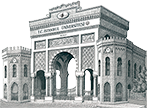Symposiums
The Mathematical Sciences in Islamic History: New Approaches, Topics, and Contexts 25-27 May 2023, İstanbul
In memory of Prof. Dr. Fuat Sezgin, who was one of the most distinguished scholars in Islamic studies and whom we lost in 2018, and as a contribution to the growing interest in the history of science, two symposia on the history of science in Islamic societies were organized in 2019 and 2021. The third symposium will take place in Istanbul on 25-27 May 2023. While the first symposium did not limit itself periodically and thematically, the second one was framed with a special interest in “Methodological Approaches to the History of Science in Islam.” The third meeting will in turn focus on the mathematical sciences.
Among the studies that have so far been produced on Islamic science, those related to the mathematical sciences occupy a remarkable place both qualitatively and quantitatively. In this respect, the third symposium will aim to set the ground for the existing literature to be critically evaluated and for historiographical discussions to be made regarding possible directions for future studies in the field. From this point of view, the symposium will address all theoretical and practical sciences that were considered under the mathematical sciences in the premodern period, including arithmetic, geometry, astronomy and other astral sciences, music, optics, and mechanics. Along with papers that deal with technical examinations of scientific instruments and content-based analysis of texts, the symposium welcomes research outputs exploring contexts within which the mathematical sciences developed, ways through which they became mediums for intercultural exchanges, and networks of sciences-texts-scholars.
Being organized by Prof. Dr. Fuat Sezgin Research Foundation for the History of Science in Islam, Institute of Islamic Studies at Istanbul University, Prof. Dr. Fuat Sezgin Institute of the History of Science in Islam at Fatih Sultan Mehmet Vakif University and TÜBA (Turkish Academy of Sciences) the symposium will address the following questions, but not limited:
How and under which circumstances did studies on the history of the mathematical sciences in Islam emerge?
How was the pre-Islamic scientific heritage received? How influential was this reception on the development of sciences in the Islamic context?
What are the religious, cultural, political, economic, and social factors that informed the reception and development of the mathematical sciences?
What is the place of the mathematical sciences in Islamic intellectual history?
How does one situate studies on the Islamic mathematical sciences within the history of science literature?
How could one periodize the Islamic mathematical sciences as a whole or each of them independently?
What are the theoretical and practical implications of the mathematical sciences in Islamic societies? In which domains were they utilized?
How did interactions between the various sciences (mathematical, religious, and natural) take place?
What role did the mathematical sciences play regarding Islamic interactions with the different cultures?
As far as different periods and locations of Islamic history are concerned, were there fluctuations in the Islamic interest in the mathematical sciences? If so, what are the reasons behind them?
Which institutions played a role in the production and circulation of the mathematical sciences?
How were the mathematical sciences taught across the ages and various locations?
How could one characterize textbooks that were used for the study of the mathematical sciences in Islamic societies and what could be said regarding their hierarchical and pedagogical relations?
By which methods and approaches were the Islamic mathematical sciences studied? What could one say regarding directions for future studies?
Important Dates
Deadline for abstracts: December 15, 2022
Announcement of accepted papers: January 1, 2023
Symposium dates: May 25-27, 2023
Language of Papers and Presentations
Papers could be presented in Turkish, Arabic, or English.
Transportation and Accommodation
Transportation and accommodation expenses of accepted applicants from outside Istanbul will be covered.
For detailed information: http://www.fuatsezginsempozyumu.org/en/home/
MAMLUK SYMPOSIUM II
SCIENCE, THOUGHT, ART AND INSTITUTIONS
The rich endowments established by the Mamluks and the institutions and activities those endowments supported played an essential role in preserving, developing, and transmitting the scientific and intellectual heritage of Islam across the Muslim world, even long after Mamluk rule itself had come to an end. For this symposium, we invite scholars to present papers on this legacy, on the intellectual and artistic activities of the Mamluk lands and their effects on other regions and later periods
Several activities will be organized to introduce symposium participants to important historical sources, Institutions, and resources relating to Mamluk studies in Turkey and Istanbul.
A trip will also be organized to the Suleymaniye Library of the Turkish Manuscript Institution (Yazma Eserler Kurumu), where participants will have the chance to examine physical copies of a group of Mamluk-era works.
Participants coming from outside Istanbul will receive support to defray the cost of travel, and their
accommodation expenses will be covered.
During the symposium, all meals will be provided.
1-2 June 2023
Istanbul University Rectorate
Papers may focus on any aspect of this legacy. We welcome papers on the mobility of knowledge, ideas, and skills between regions, whether through institutional structures, travel, books, or other means. We welcome papers on religious studies, the sciences, technology, and political and su thought, as well as activities and institutions related to the cultivation and transmission of these and other fields of inquiry and endeavor, including those dealing with figures, ideas, and works in such disciplines as hadith, jurisprudence, juristic opinions, theology, Sufism, historiography, logic, philosophy, ethics, political thought, the natural sciences, math, art, architecture, linguistics, and Quranic studies, exegesis, and recitation.
Important Dates:
Deadline for the submission of papers: 1 December 2022
Announcement of accepted papers : 15 December 2022
Email for abstracts: mamluks@istanbul.edu.tr
For detailed information: islam-tetkikleri-memlukler.pdf
